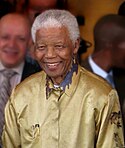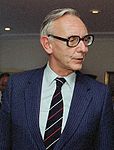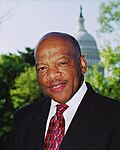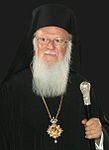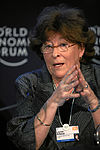Four Freedoms Award

The Four Freedoms Award is an award that is given annually to people or groups who have earned " The Four Freedoms ", which US President Franklin D. Roosevelt invoked in his speech to the American Congress on January 6, 1941 have made.
In odd years, the award is given in Hyde Park , New York , by the Franklin and Eleanor Roosevelt Institute to Americans; in even years in Middelburg , Netherlands , the "Roosevelt Stichting" honors non-Americans.
The prize is awarded in five categories:
- Freedom Medal
- Freedom of speech and expression (Freedom of speech and expression)
- Religious Freedom (Freedom of worship)
- Freedom from want (Freedom from want)
- Freedom from fear (Freedom from fear)
In 1984, 1990, 1995, 2002 to 2006 and 2008 additional prizes were given to individuals.
history

On January 6, 1941, Roosevelt invoked the four fundamental human freedoms at the State of the Union Address , which is why it is also known as the Four Freedoms speech. This was before the attack on Pearl Harbor and thus before the start of America's involvement in World War II .
“In the future days, which we seek to make secure, we look forward to a world founded upon four essential human freedoms. The first is freedom of speech and expression - everywhere in the world. The second is freedom of every person to worship God in his own way - everywhere in the world. The third is freedom from want, which, translated into world terms, means economic understandings which will secure to every nation a healthy peacetime life for its inhabitants - everywhere in the world. The fourth is freedom from fear, which, translated into world terms, means a world-wide reduction of armaments to such a point and in such a thorough fashion that no nation will be in a position to commit an act of physical aggression against any neighbor - anywhere in the world. "
“In the days to come, which we strive to keep safe, we look forward to a world founded on four essential human freedoms. The first of these freedoms is speech and expression - anywhere in the world. The second of these freedoms is that of every person to worship God in their own way - anywhere in the world. The third of these freedoms is freedom from want. Seen worldwide, this means economic understanding that grants every nation a life in health and peace for its inhabitants - all over the world. But the fourth freedom is that of fear. Seen worldwide, this means global disarmament, carried out so thoroughly and until no state is in a position to attack its neighbors by force of arms - nowhere in the world. "
Roosevelt's wife Eleanor Roosevelt remained after the death of her husband in 1945, an active campaigner for the recording of the four freedoms in the Universal Declaration of Human Rights of the United Nations .
The prizes were first awarded in 1982. The occasion was both the 100th birthday of Roosevelt and the 200th anniversary of the establishment of diplomatic relations between the United States and the Netherlands.
Excellent
Freedom Medal
| year | Middelburg | year | Hyde Park |
|---|---|---|---|
| 1982 | Juliana (Netherlands) | 1983 | Averell Harriman |
| 1984 | Harold Macmillan | 1985 | Claude Pepper |
| 1986 | Alessandro Pertini | 1987 | Thomas P. O'Neill, Jr |
| 1988 | Helmut Schmidt | 1989 | William Joseph Brennan |
| 1990 | Václav Havel and Jacques Delors | 1991 | Thurgood Marshall |
| 1992 | Javier Pérez de Cuéllar | 1993 | Cyrus Vance |
| 1994 | Dalai Lama | 1995 | Jimmy Carter |
| 1996 | Juan Carlos I. | 1997 | Katharine Graham |
| 1998 | Mary Robinson | 1999 | Edward Kennedy |
| 2000 | Martti Ahtisaari | 2001 | World War II veterans, represented by |
| 2002 | Nelson Mandela | 2003 | George J. Mitchell |
| 2004 | Kofi Annan | 2005 | Bill Clinton |
| 2006 | Mohammed el-Baradei | 2007 | Carl Levin and Richard Lugar |
| 2008 | Richard von Weizsäcker | 2009 | Hillary Clinton |
| 2010 | European Court of Human Rights | 2011 | Russ Feingold |
| 2012 | Luiz Inácio Lula da Silva | 2013 | Wendell Berry |
| 2014 | Red Cross | 2015 | Ruth Bader Ginsburg |
| 2016 | Angela Merkel |
freedom of speech

-
The first of these freedoms is speech and expression - anywhere in the world.
Roosevelt, January 6, 1941
| year | Middelburg | year | Hyde Park |
|---|---|---|---|
| 1982 | Max van der Stoel | 1983 | Joseph L. Rauh, Jr. |
| 1984 | Amnesty International | 1985 | Kenneth B. Clark |
| 1986 | El País | 1987 | Herbert Block |
| 1988 | Ellen Johnson Sirleaf | 1989 | Walter Cronkite |
| 1990 | not awarded | 1991 | James B. Reston |
| 1992 | Mstislav Rostropovich | 1993 | Arthur Miller |
| 1994 | Marion Countess Dönhoff | 1995 | Mary McGrory |
| 1996 | John Hume | 1997 | Sidney R. Yates |
| 1998 | CNN | 1999 | John Lewis |
| 2000 | Bronislaw Geremek | 2001 | The New York Times |
| 2002 | Radio Free Europe and Radio Liberty | 2003 | Studs Terkel |
| 2004 | Lennart Meri | 2005 | Tom Brokaw |
| 2006 | Carlos Fuentes | 2007 | Bill Moyers |
| 2008 | Lakhdar Brahimi | 2009 | Anthony Romero |
| 2010 | Novaya Gazeta | 2011 | Michael J. Copps |
| 2012 | Al Jazeera | 2013 | Paul Krugman |
| 2014 | Maryam Durani | 2015 | Arthur Mitchell |
| 2016 | Mazen Darwish |
Religious freedom
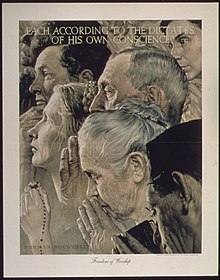
-
The second of these freedoms is that of every person to worship God in their own way - anywhere in the world.
Roosevelt, January 6, 1941
| year | Middelburg | year | Hyde Park |
|---|---|---|---|
| 1982 | Willem Adolf Visser 't Hooft | 1983 | Coretta Scott King |
| 1984 | Werner Leich and Christiaan Frederick Beyers Naudé | 1985 | Elie Wiesel |
| 1986 | Bernard Jan Alfrink | 1987 | Leon Sullivan |
| 1988 | Teddy Kollek | 1989 | Raphael Lemkin (posthumously) and Hyman Bookbinder |
| 1990 | László Tőkés | 1991 | Paul Moore, Jr. |
| 1992 | Terry Waite | 1993 | Theodore M. Hesburgh , CSC |
| 1994 | Gerhart M. Riegner | 1995 | Andrew Young |
| 1996 | Robert Runcie | 1997 | William H. Gray |
| 1998 | Desmond tutu | 1999 | Corinne C. Boggs |
| 2000 | Cicely Saunders | 2001 | Johnnie Rebecca Carr |
| 2002 | Nasr Hamid Abu Zaid | 2003 | Robert F. Drinan |
| 2004 | Sari Nutseibeh | 2005 | Cornel West |
| 2006 | Taizé Community | 2007 | Peter Gomes |
| 2008 | Karen Armstrong | 2009 | Eboo Patel |
| 2010 | Asma Jahangir | 2011 | Barry W. Lynn |
| 2012 | Bartholomew I. | 2013 | Simone Campbell |
| 2014 | Hassan ibn Talal | 2015 | William Barber |
| 2016 | Dieudonné Nzapalainga , Omar Kobine Layama and Nicolas Guérékoyame-Gbangou |
Freedom from want

-
The third of these freedoms is freedom from want . Seen worldwide, this means economic understanding that grants every nation healthy peace conditions for its inhabitants - all over the world.
Roosevelt, January 6, 1941
| year | Middelburg | year | Hyde Park |
|---|---|---|---|
| 1982 | Johan Witteveen | 1983 | Robert McNamara |
| 1984 | Liv Ullmann | 1985 | John Kenneth Galbraith |
| 1986 | Bradford Morse | 1987 | Mary Lasker |
| 1988 | Halfdan T. Mahler | 1989 | Dorothy I. Height |
| 1990 | Emiel van Lennep | 1991 | Paul Newman and Joanne Woodward |
| 1992 | Jan Tinbergen | 1993 | Eunice Shriver and Sargent Shriver |
| 1994 | Sadako Ogata | 1995 | Lane Kirkland |
| 1996 | Doctors Without Borders | 1997 | Mark Hatfield |
| 1998 | Stéphane Hessel | 1999 | George McGovern |
| 2000 | MS Swaminathan | 2001 | March of Dimes |
| 2002 | Gro Harlem Brundtland | 2003 | Dolores Huerta |
| 2004 | Marguerite Barankitse | 2005 | Marsha J. Evans |
| 2006 | Muhammad Yunus , Grameen Bank | 2007 | Barbara Ehrenreich |
| 2008 | Jan Egeland | 2009 | Vicki Escarra |
| 2010 | Maurice Strong | 2011 | Jacqueline Novogratz |
| 2012 | Ela Bhatt | 2013 | Coalition of Immokalee Workers |
| 2014 | Hawa Abdi Diblaawe | 2015 | Olufunmilayo Olopade |
| 2016 | Denis Mukwege |
Freedom from fear
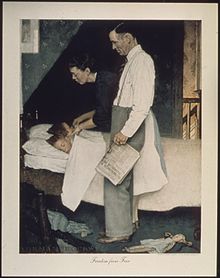
-
The fourth freedom is freedom from fear . Seen worldwide, this means global disarmament, carried out so thoroughly and until no state is in a position to attack its neighbors by force of arms - anywhere in the world.
Roosevelt, January 6, 1941
| year | Middelburg | year | Hyde Park |
|---|---|---|---|
| 1982 | J. Herman van Roijen | 1983 | Jacob K. Javits |
| 1984 | Brian Urquhart | 1985 | Isidore Isaac Rabi |
| 1986 | Olof Palme (posthumous) | 1987 | George F. Kennan |
| 1988 | Armand Hammer | 1989 | James William Fulbright |
| 1990 | Simon Wiesenthal | 1991 | Mike Mansfield |
| 1992 | Lord Carrington | 1993 | George Wildman Ball |
| 1994 | Zdravko Grebo | 1995 | Elliot L. Richardson |
| 1996 | Shimon Peres | 1997 | Daniel K. Inouye |
| 1998 | Craig Kielburger | 1999 | Bobby Muller |
| 2000 | Louise Arbor | 2001 | World War II veterans, represented by |
| 2002 | Ernesto Zedillo Ponce de León | 2003 | Robert Byrd |
| 2004 | Max Kohnstamm | 2005 | Lee H. Hamilton and Thomas Kean |
| 2006 | Aung San Suu Kyi | 2007 | Brent Scowcroft |
| 2008 | Was child | 2009 | Pasquale D'Amuro |
| 2010 | Gareth Evans | 2011 | Bryan A. Stevenson |
| 2012 | Hussain al-Shahristani | 2013 | Ameena Matthews |
| 2014 | Malala Yousafzai | 2015 | The Nation |
| 2016 | Human Rights Watch |
Special awards
| 1984 | Simone Veil ( centenial award ) | 2002 | William J. Vanden Heuvel | 2005 | BBC World Service |
| 1990 | Mikhail Gorbachev | 2003 | Arthur M. Schlesinger | 2005 | Mary Soames |
| 1995 | Jonas Salk | 2004 | Anton Rupert | 2006 | Mike Wallace |
| 1995 | Ruud Lubbers | 2004 | Bob Dole | 2008 | Forrest Church |
literature
- AL Oosthoek: Roosevelt in Middelburg. The four freedoms awards 1982–2008. 2010, ISBN 978-9079875214
Web links
- Four Freedoms Awards website (Dutch and English)
- List of winners on the website of the Roosevelt Institute (English)
- NOS: TV documentary about the Four Freedoms Award (Dutch, 2008)
Individual evidence
- ↑ a b c Roosevelt Stichting: The Four Freedoms Medals On: Fourfreedoms.nl, accessed on November 29, 2012.
- ^ Franklin Delano Roosevelt: The Four Freedoms Speech On: Americanrhetoric.com, accessed November 29, 2012.



